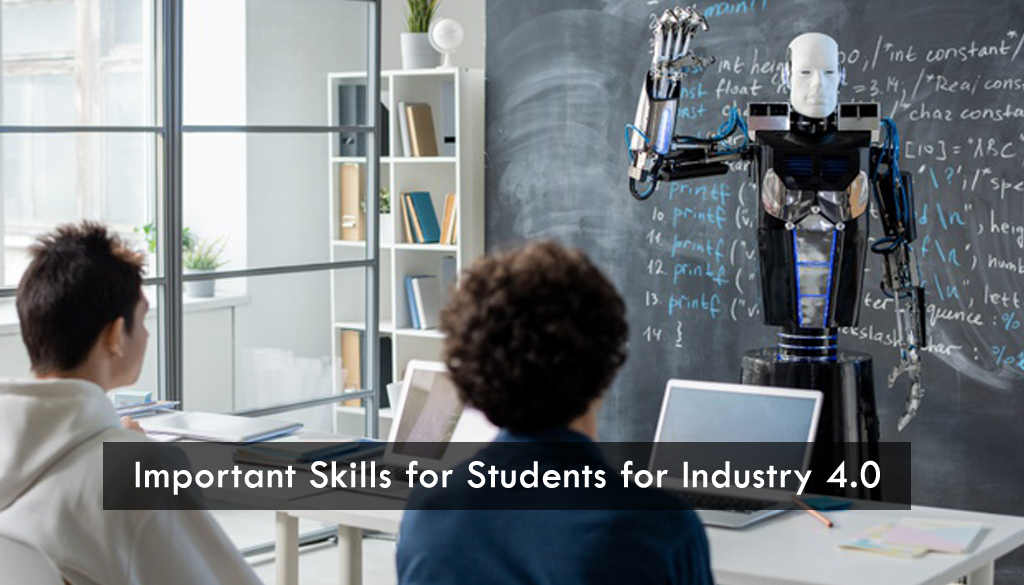
Important Skills for Students for Industry 4.0
The first industrial revolution focused on mechanization through water and steam power, whereas the mass production and assembly lines using electricity as a source of energy was used in the second industrial revolution. The third industrial revolution came with electronics, I.T. systems, and with development of automation. This, in essence, led to the fourth industrial revolution which primarily focussed on cyber physical systems. The fourth industrial revolution was elemental in taking the transformations of the third industrial revolution further by adopting advancements in computers and automation and enhancing it with smart and autonomous systems supported by data and machine learning.
Industry 4.0 vs Industry 3.0
When computers were introduced in Industry 3.0, it was a step towards the addition of an entirely new technology. But now with the evolution in Industry 4.0, computers connected and communicated with one another to ultimately make decisions without human involvement. A combination of new technologies such as cyber-physical systems, the Internet of Things, and the Internet of Systems make the generation of smart industry possible. With the progression in technology, the resultant is the culmination of systems that access data by themselves and thereby enhance the productivity of the industry. Henceforth, it is through this network that Industry 4.0 is able to sustain itself.
Industry 4.0 Technologies-
Industry 4.0 encompasses the growing trend in the realm of automation, data exchange in technology, and processes within the manufacturing industry, including:
- The internet of things (IoT), The industrial internet of things (IIoT)
- Cyber-physical systems (CPS), Cloud computing, Block chain, Artificial intelligence
- Smart factories, Smart manufacturing
Industry 4.0, also sometimes referred to as smart manufacturing, means physical production and operations with smart digital technology, machine learning, and big data to create a more comprehensive and better connected ecosystem for companies that mainly focus on manufacturing and supply chain management.
Robots: Initially it was possible only for large enterprises to manufacture robots with equally large budgets, but now robots are more affordable and available to organizations of every size. The implementation of robots in the manufacturing process is highly efficient as they can help in varied logistics like manufacturing, production, and shipping.
Additive manufacturing (3D printing): Having witnessed a great transformation in the past decade, this technology is now used in actual production rather than in merely prototyping. Advances in the use of metal additive manufacturing have opened up a lot of possibilities for production and a lot of new industries are in the process of adopting this new technique.
Internet of Things and the cloud: Internet of Things is a key component of Industry 4.0. It is characterized by connected devices. IOT not only helps in internal operations, but through the use of the cloud environment where data is stored, equipment and operations can be optimized by leveraging the insights on the usage of the same equipment by others.
Skills Required to excel in Industry 4.0
With the evolution of Industry 4.0 and transformation in the realm of technology, newer domains of skills are required to excel in this novel field. Some of the skills that an individual can work on and develop are:
- Analytical Ability
- Critical Thinking
- Familiarization with new technologies
- Eager to learn about upcoming technologies
- Effective Problem Solving
- Both a team player and a team leader
- Ideation
- Innovation
- Attention to detail
- Creativity and originality
Industry 4.0 and its Relevance
Industry 4.0 offers a more comprehensive, interconnected approach to manufacturing. It ensures connection of physical with digital, and enhances the quality of collaboration across departments. Hence, Industry 4.0 benefits industry owners to optimize their operations efficiently.
Companies that are adopting these technologies realize Industry 4.0’s potential. Hence, it can be easily understood that educational institutes and universities should include new courses (such as IOT, Cyber security, Robotics, 3-D printing etc.) in their curriculum so that industries can easily employ this energetic and trained team of engineers.
The technology enabled by IoT would provide the manufacturer an opportunity to cognize their operation with total visibility. From procurement of raw material, maintaining inventory, and analysing production, everything can be taken care of through this technology. In all the mentioned operations, a student passing out with the knowledge of smart manufacturing and Industrial Automation will be able to make real value addition in achieving the desired targets of the industry.
Courses to stay relevant in Industry 4.0:
Here is the list of top and in-demand courses/specializations of Industry 4.0 that students can take up. Students can pursue B.Tech or Diploma courses as suitable in the following:
- Artificial Intelligence
- Machine Learning
- Internet of Things
- Cloud DevOps
- Cloud Computing
- Data Analytics
- Cyber Security & Threat Intelligence
- Digital Forensics
- Smart Manufacturing and Automation
- Automation and Robotics
CAREER OPPORTUNITIES IN INDUSTRY 4.0
With exponential growth in the industry and emergence of technologies, the need for skilled professionals is also increasing. An aspirant needs to start thinking about the future now with a thoughtful choice! Below is the list of top job profiles in Industry 4.0:
- Equipment Systems Engineer
- Data Scientist
- Controls Systems Engineer
- Automation Engineer
- Validation Engineer
- UI and UX Designer
- Project Manager
- Robotics Engineer
- IT Solution Architect
- 3D Printing Engineer
- Medical Robot Designer
- Data Security Expert
- Cyber Security Expert
The evolution of technologies is changing dynamics of the industry and staying relevant with the necessary skills is the need of the hour.
Written By:- Mr. Sanjay Taneja and Dr Sujata Nayak, Department of Mechanical Engineering, Manav Rachna University



